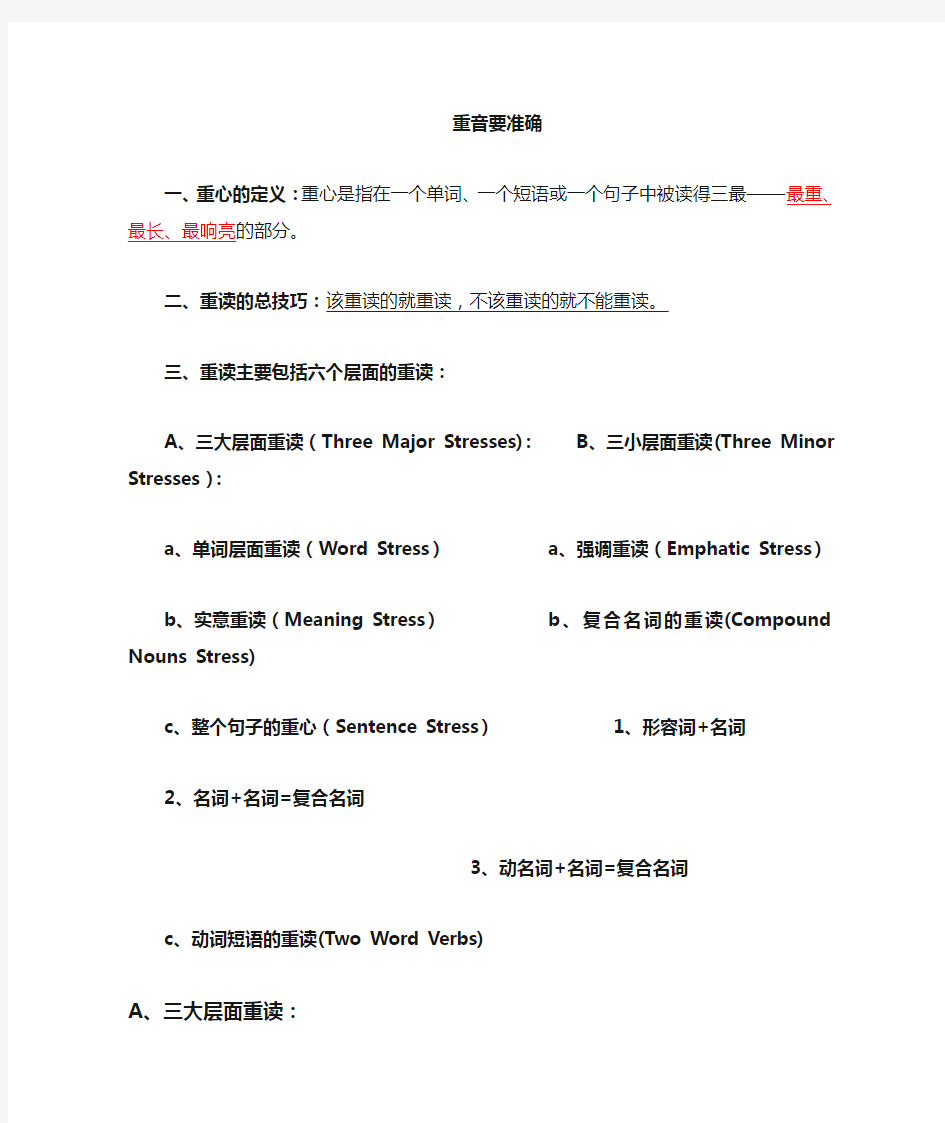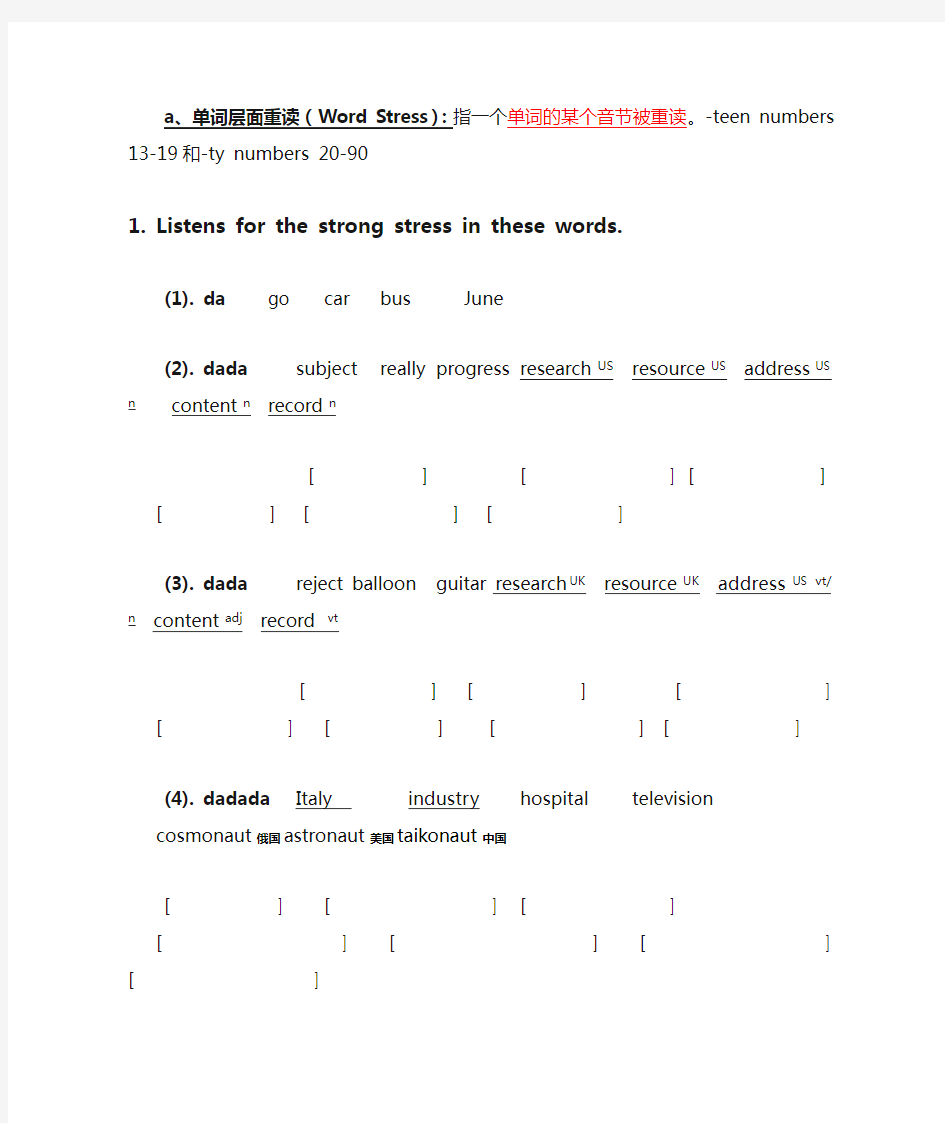重音和语调


重音要准确
一、重心的定义:重心是指在一个单词、一个短语或一个句子中被读得三最——最重、最长、最响亮的部分。
二、重读的总技巧:该重读的就重读,不该重读的就不能重读。
三、重读主要包括六个层面的重读:
A、三大层面重读(Three Major Stresses):
B、三小层面重读(Three Minor Stresses):
a、单词层面重读(Word Stress)a、强调重读(Emphatic Stress)
b、实意重读(Meaning Stress)b、复合名词的重读(Compound Nouns Stress)
c、整个句子的重心(Sentence Stress)1、形容词+名词
2、名词+名词=复合名词
3、动名词+名词=复合名词
c、动词短语的重读(Two Word Verbs)
A、三大层面重读:
a、单词层面重读(Word Stress):指一个单词的某个音节被重读。-teen numbers 13-19和-ty numbers 20-90
1. Listens for the strong stress in these words.
(1). da go car bus June
(2). dada subject really progress research US resource US address US n content n record n
[ ???●?] [ ???????] [ ??????] [ ?????]
[ ???????] [ ??????]
(3). dada reject balloon guitar research UK resource UK address US vt/ n content adj record vt
[???●◆??] [??????] [????????] [???????] [??????] [ ???????] [???????]
(4). dadada Italy industry hospital television cosmonaut俄国astronaut美国taikonaut中国
[ ???●?] [ ????????] [ ??????●] [ ??●??????]
[ ?????◆????] [ ?????????] [ ?????????]
(5). dadada Italian industrial employer accountant会计professor
[????●???] [??????????●] [????●????] [????◆?????]
(6). dadada guarantee volunteer employee resume gasoline汽油represent
[ ?????????] [ ?●??????] [ ???●?????] [????◆?????] [?????●???] [ ???????????]
engineer afternoon entertain Japanese introduce
2.请识别下列单词的重音的位置:
(1). comparison [ ?????????]
(2). obvious obviously
[ ??????] [ ??????●?]
(3). hospitable hospitability
[ ????????●] [ ????????●???]
(4). interview interviewer interviewee
[ ??????◆?] [?????????????] [???????◆????]
(5). exam examiner examinee
[??????] [??????????] [??????????]
(6). interpret interpreter interpretation
[??????????] [????????????] [????????????????]
(7). economy economist economics economical
[???????????] [???????????] [ ???????????]
[ ???????????●]
b、实意重读(Meaning Stress):是指在一个句子中,只有实词一定要重读,虚词被弱读(说话人要着重强调某一个虚词时除外)。(讲英语时,重音不可平均分布、一定要有轻重缓急、抑扬顿挫。)
1、实词(Content Words):有自身实在意义的单词。实词包括:动、名、形、副、名称、数字、序数词、指示代词、反身代词、疑问代词、名词性物主代词。
What kinds of words retain their strong stress in sentences? In general, stressed words are content words: verbs, nouns, adjectives, and adverbs. Listen and repeat the sentences.
1. Verbs: speak, study, read, writing, studying, etc.
2. Nouns: Anne, table, desk, professor, book, etc.
3. Adjectives: tall, young, new, blue, etc.
4. Adverbs:today, tomorrow, now, here, etc.
(1). Anne is sitting at her desk. (3). She is using a blue pen.
(noun) (verb) (noun) (verb) (adj) (noun)
(2). She is writing a letter. (4). She will mail the letter tomorrow.
(verb) (noun) (verb) (noun) (adv)
2、虚词(Function Words):没有自身的实在意义,只参与组成句子的语法架构的单词。
虚词包括:介、代(主格代词、宾格代词、物主代词)、助、冠、连词。
What kinds of words lose their strong stress in sentences? For the most part, they are short function words (some times called grammar words). However, they are some of the most frequently used words in English. Mostly, these are prepositions, pronouns, auxiliaries, articles and connectors.
1. Prepositions: at, in, of, on, about, to, from, etc.
2. Pronouns: he, she, his, us, them, I, my, etc.
3. Auxiliaries (and be): is, are, does, will, can, etc.
4. Articles:a, an, the, some
5. Connectors: and, or, but
(1). I’m going to Canada. (4). I need some money.
(2). She was studying English. (5). I need pencil and paper.
(3). Does she speak it?
c、整个句子的重心(Sentence Stress):
句子重心定位法:在不做刻意强调的情况下,一个句子的重心往往落在这个句子里的最后一个实意重读单元上。
1. Listen to these sentences, then repeat them, paying particular attention to the sentence stress.
(1). I’m going to the store. (5). The plane is going to London.
(2). I have the tickets. (6). Jack is my brother.
(3). Let’s make some candy. (7). I can’t leave tomorrow.
(4). Helen is our teacher. (8). A bird is flying in the sky.
2. Listen to these sentences. Then mark the sentence stress. Use this mark ’.
(1). He put the lamp on the table. (4). Helen is studying English.
(2). The doctor looked at the baby. (5). English is a widely used language.
(3). Some friends are coming for lunch. (6). Doctors wear white coats.
B、三小层面重读:
a、强调重读(Emphatic Stress)的规律:强调什么重读什么。
b、复合名词的重读(Compound Nouns Stress) 的规律:
★1、形容词+名词重心落在后面的名词上。例:beautiful girl
★2、名词+名词=复合名词重心落在前面的名词上。
class + room→classroom bed + room→bedroom ball + pen →ball pen bookstore candy store barbershop post office drugstore doctor’s office English class English teacher music teacher birthplace coffee cup seashore toothpaste tape recorder cassette tape bus driver raincoat birthday card airline airplane airport plane ticket notebook newspaper
★3、动名词+名词=复合名词重心落在前面的动名词上。
living + room→living room swimming + pool→swimming pool shopping +center→shopping center dining room wedding ring publishing house washing machine
c、动词短语的重读(two word verbs)的规律:
1. 动词短语的组成形式是:动词+非实意副词(如on, off等),其重心落在后面的副词上。
2. 动词短语也可以带宾语:(1).若宾语为名词,则重心落在名词上。
(2).若宾语为代词,则重心落在副词上。
Listen. Then repeat the phrases.
(1). burn up burn up the letter burn the letter up burn it up
(2). try on try on the gloves try the gloves on try them on
(3). eat up eat up the cake eat the cake up eat it up
(4). drink up drink up the water drink the water up drink it up
八、语调要波动
一、宏观语调:
1. I have been to the States for twice. 3. Would you like to take a walk?
2、What do you plan to do tomorrow? 4. Are you a student?
二、“句内语调波动”技巧:语调平平,会令听众困倦。12字口诀:实重升,虚弱降、抬眉毛,打拍子。
步骤1、先判断:每个单词的词性,哪些是实词,哪些是虚词。
步骤2、根据“实重升,虚弱降”——实词、重读、升调,虚词、弱读、降调,判断句中单词是重读还是弱读,同时打点(必须精确判断每一个重音到底落在一个单词的哪一个音节上)。
步骤3、把各点连成圆滑波浪线(而非长城城墙线和心电图线)。
步骤4、语调有升有降地朗读:
技巧1、根据波浪线的提示朗读:线扬则调升,线落则调降。
技巧2、把自己想象成少儿老师或家长:表露情感→表情→“抬眉毛eyebrows,打拍子”。
技巧3、句中的逗号表示读说句子中途暂停,整个句子还没说完,所以调子最好不要立刻降下来。
夸张的表情:眉毛抬高,眼睛睁大。以后表情会自然到位,不必再这般夸张了。
Since many of you are planning to study at a college or university in this country,
you may be curious to know what a typical college course is like.
curious [ ??◆?????] 对..好奇的typical [ ??????●] 典型的
